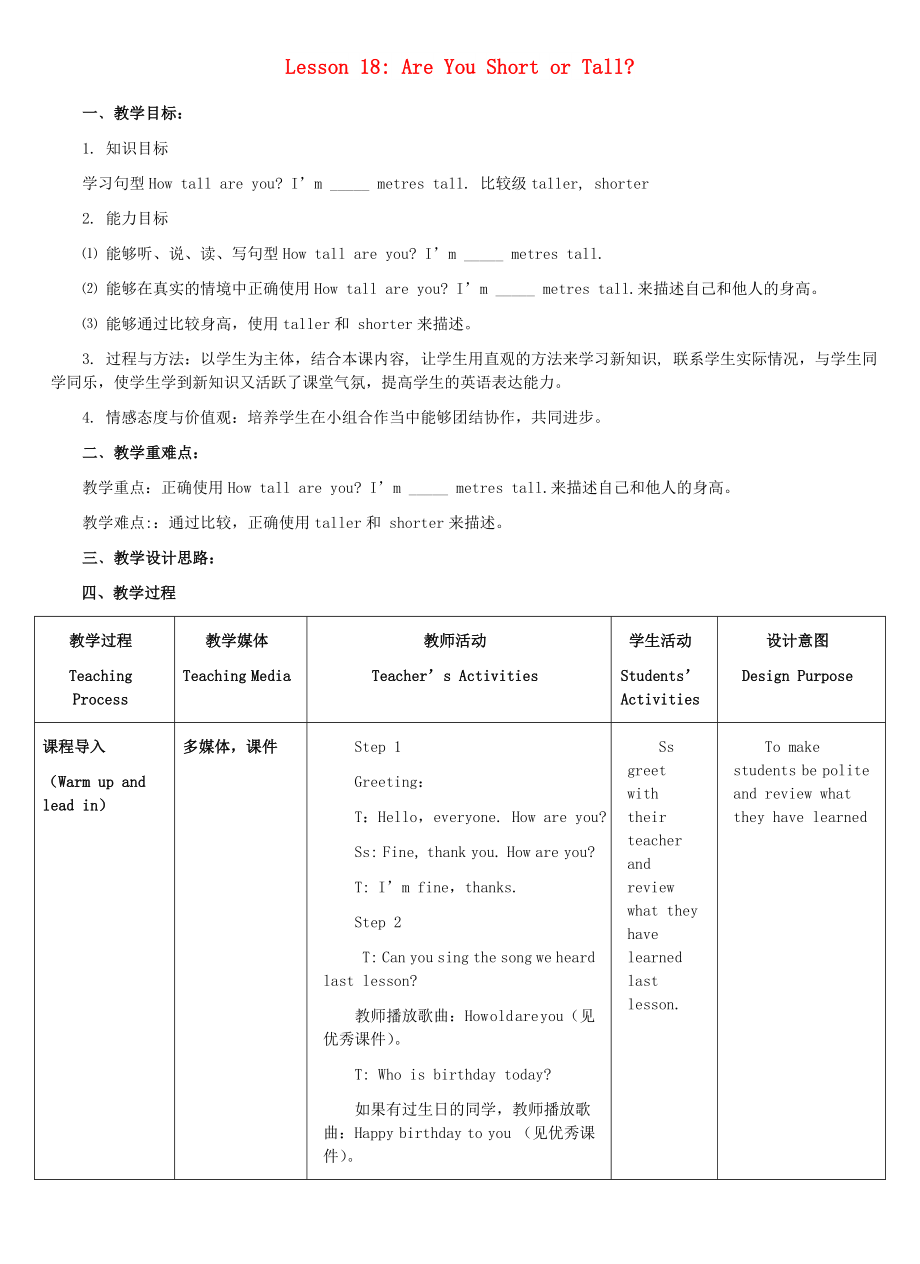《四年級(jí)英語(yǔ)下冊(cè) Unit 3 All about Me Lesson 18 Are You Short or Tall教案 冀教版》由會(huì)員分享��,可在線閱讀�,更多相關(guān)《四年級(jí)英語(yǔ)下冊(cè) Unit 3 All about Me Lesson 18 Are You Short or Tall教案 冀教版(3頁(yè)珍藏版)》請(qǐng)?jiān)谘b配圖網(wǎng)上搜索。
1����、Lesson 18: Are You Short or Tall?
一﹑教學(xué)目標(biāo):
1. 知識(shí)目標(biāo)
學(xué)習(xí)句型How tall are you? I’m _____ metres tall. 比較級(jí)taller, shorter
2. 能力目標(biāo)
⑴ 能夠聽、說(shuō)����、讀、寫句型How tall are you? I’m _____ metres tall.
⑵ 能夠在真實(shí)的情境中正確使用How tall are you? I’m _____ metres tall.來(lái)描述自己和他人的身高��。
⑶ 能夠通過(guò)比較身高�����,使用taller和 shorter來(lái)描述�。
3. 過(guò)程與方法:以學(xué)生為主體
2、����,結(jié)合本課內(nèi)容, 讓學(xué)生用直觀的方法來(lái)學(xué)習(xí)新知識(shí), 聯(lián)系學(xué)生實(shí)際情況,與學(xué)生同學(xué)同樂(lè)��,使學(xué)生學(xué)到新知識(shí)又活躍了課堂氣氛���,提高學(xué)生的英語(yǔ)表達(dá)能力�。
4. 情感態(tài)度與價(jià)值觀:培養(yǎng)學(xué)生在小組合作當(dāng)中能夠團(tuán)結(jié)協(xié)作��,共同進(jìn)步�。
二﹑教學(xué)重難點(diǎn):
教學(xué)重點(diǎn):正確使用How tall are you? I’m _____ metres tall.來(lái)描述自己和他人的身高。
教學(xué)難點(diǎn)::通過(guò)比較���,正確使用taller和 shorter來(lái)描述�����。
三﹑教學(xué)設(shè)計(jì)思路:
四���、教學(xué)過(guò)程
教學(xué)過(guò)程
Teaching Process
教學(xué)媒體
Teaching Media
教師活動(dòng)
Teacher’
3����、s Activities
學(xué)生活動(dòng)
Students’ Activities
設(shè)計(jì)意圖
Design Purpose
課程導(dǎo)入
(Warm up and lead in)
多媒體��,課件
Step 1
Greeting:
T:Hello��,everyone. How are you?
Ss: Fine, thank you. How are you?
T: I’m fine���,thanks.
Step 2
T: Can you sing the song we heard last lesson?
教師播放歌曲:How old are you(見(jiàn)優(yōu)秀課件)����。
T
4���、: Who is birthday today?
如果有過(guò)生日的同學(xué)���,教師播放歌曲:Happy birthday to you (見(jiàn)優(yōu)秀課件)。
Ss greet with their teacher and review what they have learned last lesson.
To make students be polite and review what they have learned
呈現(xiàn)新課
(Present
the new lesson)
錄音機(jī)�����,多媒體量身高的尺子,課件���。
Step 1
T: Do you know how old I a
5��、m? Can you guess? 讓學(xué)生去猜測(cè)自己的年齡
T: Do you know how tall I am? 教師利用手勢(shì)提示學(xué)生,使學(xué)生明白教師在說(shuō)身高�����。
T: I’m 1.60 metres tall. 教師站在量身高的尺子旁�,自問(wèn)自答,呈現(xiàn)表達(dá)身高的新句型�。
Step 2. Presentation
1. 教學(xué)小數(shù)的讀法
T: I’m 1.60 metres tall. 教師邊說(shuō)邊板書新句型。
指著1.60��,教學(xué)生小數(shù)的讀法�,小數(shù)點(diǎn)讀作point. 教師任意板書小數(shù)。鼓勵(lì)學(xué)生去讀一讀����。如:1.2 1.35 0.57 2.65
2. 教學(xué)句型How t
6、all are you? I’m _____ metres tall.
T: I’m 1.60 metres tall. How tall are you?
教師板書新句型�����,教師領(lǐng)讀,學(xué)生跟讀��,操練至學(xué)生能夠流利說(shuō)出��。
Step 3. Practice
1. 師生問(wèn)答How tall are you? I’m _____ metres tall.讓學(xué)生到尺子旁量身高��,用新句型說(shuō)說(shuō)自己的身高�。師生對(duì)比,用tall和short來(lái)形容���。
同桌之間互相用尺子量身高��,操練句型How tall are you? I’m _____ metres tall.
T: Do you want to
7�����、 know your friends? How tall is your friend? Ask him or her“How tall are you?”教師引導(dǎo)生生問(wèn)答�����,鞏固操練新句型����。
教師指著一名班級(jí)中比較高又比自己矮的學(xué)生說(shuō)I’m 1.60 metres tall. You are ____ metres tall. I am taller. You are shorter.
通過(guò)師生之間身高的對(duì)比,呈現(xiàn)taller 和shorter的概念�����,板書taller, shorter
2. 教師播放視頻:Big, short, tall, old ,young. (見(jiàn)視頻資源)�����。
8��、T: Who is he/she? How tall is he/she? Who is taller? Who is shorter?
出示更多的圖片��,讓學(xué)生去說(shuō)一______ is _____ metres tall. _____ is
taller. _____ is shorter.
3. 看書����,聽課文���。在聽的過(guò)程中找到這些問(wèn)題的答案�����。
How tall is Kim?
How tall is Danny?
Who is taller?
Who is shorter?
4. 播放課件:Lesson18-1, Lesson18-2, 跟讀課文�,注意學(xué)生的語(yǔ)音語(yǔ)調(diào)��。
S
9、tep 4. Consolidation
1. 教師出示自己班級(jí)的照片和幾名學(xué)生的身高��。
T: This is my class. Here are my students’ height.教師介紹自己班級(jí)學(xué)生的身高����,為學(xué)生下面的活動(dòng)作鋪墊。His/her name is _____________. He is a boy. /She is a girl. He/She is ______ years old. He/She is ______ metres tall.______________ is taller.______________ is shorter.
學(xué)生以小組為單
10���、位�,通過(guò)填表的形式調(diào)查小組同學(xué)的身高�,并比較誰(shuí)更高,誰(shuí)更矮�。之后找同學(xué)匯報(bào)。
Students read the text and practise the new sentence which they are learning.
Step 1
To make students now what they will learn
Step 2
To grasp new knowledge
Step 3,4
To grasp and consolidate what they have learned from this lesson
課堂評(píng)價(jià)
Evaluate
多媒體��,課件
隨堂練習(xí):
Hello! My name is _____. I’m from ______ Primary School. I’m _____ years old. I’m ____ metres tall. My father is _____ metres tall. My mother is _____ metres tall. ______ (am is) taller in my family. ______ (am is) shorter.
Students do exercise.
To check students’ learning ability
 四年級(jí)英語(yǔ)下冊(cè) Unit 3 All about Me Lesson 18 Are You Short or Tall教案 冀教版
四年級(jí)英語(yǔ)下冊(cè) Unit 3 All about Me Lesson 18 Are You Short or Tall教案 冀教版

